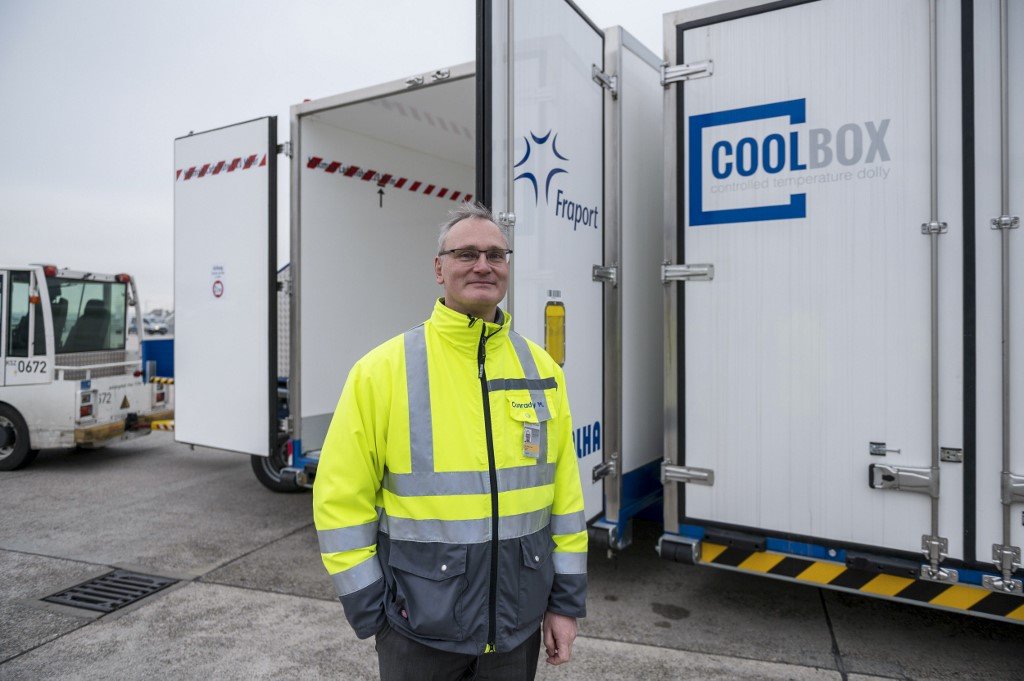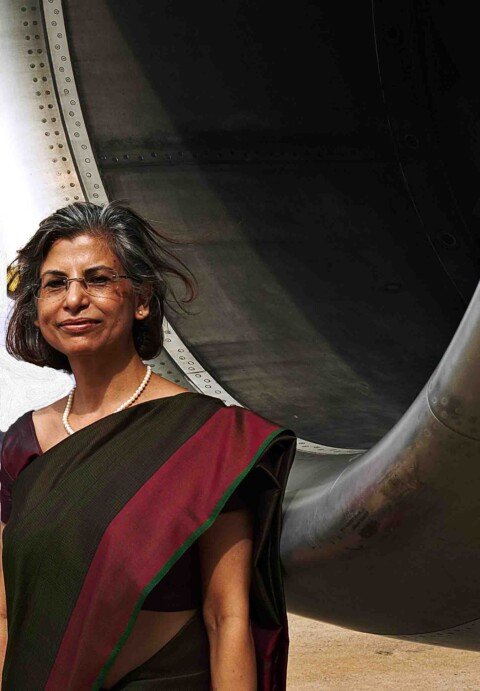Fraport’s decades of experience in ramp handling have certainly paid off – most recently, being recertified for IATA CEIV Pharma. Needless to say, the 20 state-of-the-art ultra-modern thermal transporters that the airport operator currently uses for transporting goods across the apron ensure the necessary temperature intactness of shipments. Besides, its two newest refrigerated transporters, designed specifically for pharmaceuticals, allow the inside temperature to be controlled precisely in between -200C to +300C range. In total, Frankfurt Airport currently boasts about 14,000 sq mt of temperature-controlled handling space. In a riveting conversation, Max Philipp Conrady, Head of Cargo Infrastructure and Development at Fraport AG, reveals to Upamanyu Borah, about the airport’s best possible infrastructure and service for all kind of transport, and as Europe’s leading pharma hub, how they are well-prepared and equipped to distribute the corona vaccine to destinations across the world.
With uncertainty rife, and COVID-19 holding the potential to impact every part of a business for months, scenario planning proved to be a critical tool to test preparedness. What were the best- and worst-case scenarios, and was the business equipped to cope?
It is not possible to plan a pandemic in advance. COVID-19 arrived unexpected and nobody could predict the impact of this crisis. However, we immediately started to reduce our costs and to validate each of our projects precisely. While the number of passengers began to fall dramatically, cargo traffic – after a short cut back – remained stable, and the demand for freight capacities even increased. Hence, the cargo community had to deal with an increasing demand on one hand and a decreasing number of passenger flights on the other. New processes had to be developed, passenger aircrafts began to operate as full freighters, and in some cases, with cabin load. Accordingly, the loading and unloading process had to be adapted. Moreover, the human resource planning process changed. Short-time work schedules came up and the staff had to work flexibly regardless their normal field of activity.
Scenario planning became even more important with regard to the corona vaccine transport. Experts as well as upstream and downstream supply chain partners worked together to be perfectly prepared for any option. We had to consider several factors– How would the shipment process be like? Will the vaccine be shipped as a whole or only the active substance? What are the cooling requirements?
What strategies do you use to foster innovation internally during time of a crisis and how do you structure those kinds of teams internally to get the most out of your people?
When the cabin of passenger aircrafts was used for cargo, it meant very intensive manual loading and unloading. However, smooth handling was maintained at Frankfurt Airport. This was possible due to the cooperation and sync among all partners involved– both in the airside apron area and on the landside.
Additionally, we also recognised a significant growth in charters coming to Frankfurt to compensate the loss of belly capacities. We saw and are still seeing many airlines that haven’t been to the airport before.
Overall, Frankfurt Airport’s cargo community met the challenges by working closely together. Joint solutions such as extra parking spaces, more staff, and intercompany and assistance underscored the importance of Frankfurt Airport as a strategic global cargo hub.
Our intensive commitment to building up a resilient cargo community at Frankfurt has paid off. All parties involved have communicated more effectively and information has flown more quickly. Together, we continue to ensure air cargo as vital and indispensable for delivering essential supplies to the people.
What expedited solutions are you implementing to provide a good shipping experience to forwarders?
Our strategies are set and we have always put a strong focus on innovation. Innovative platforms play an important role at our airport. They make processes more transparent and are important to allow a certain level of predictability. Besides, the ongoing development of our platforms is part of our daily business.
During the pandemic, our slot-booking systems and the strong cooperation of all our partners paid off and helped us to manage this unprecedented situation.
What is the scope of your present and future capabilities with regard to your dedicated facilities? Any example of best-in-class solution that you have brought to the market?
Located at the heart of the continent in a leading business location, Frankfurt Airport excels with highly professional handling of all types of cargo. From pharmaceuticals to dangerous goods to animals, whatever customers want to load, Frankfurt Airport offers the requisite operational expertise. Especially in the area of pharma transports, Frankfurt offers excellent infrastructure. At the airport, approximately 120,000 tonnes of vaccines, medications and other pharmaceutical products are handled every year. This makes us the European leader.
Currently, around 14,000 sq mt of temperature-controlled handling capacity are available at Frankfurt. These areas meet international and European standards like GDP or CEIV Pharma. In the course of the pandemic, we focussed on continuously optimising our pharma handling processes. We also expanded our fleet of temperature-controlled transporters to be even more ready for COVID-19 vaccine shipments.
What you believe are the implications of the intensive development in China and the role e-commerce is playing in infrastructure planning across major global airports?
E-commerce is a continuously growing market. These products require special handling options, especially with regard to the landside handling processes. We have been considering e-commerce as a crucial trend for a very long time. In the last month, there was a significant growth in this segment which was handled at Frankfurt.
Hence, for us, developing new product solutions in the area of e-commerce is a strategic goal that we are working together to achieve with our partners.
In the post COVID-19 scenario, experts believe that standards required both in terms of handling of cargo and personal hygiene will improve. Does this indicate there will be more automation coming into the entire supply chain for handling of cargo in a multimodal network?
Automation has been a highly discussed topic in the aviation industry – even much before the pandemic. And also, with regards to future developments, automated techniques will gain more and more importance. But, maybe intense hygiene measures because of the corona pandemic have pushed some automation trends to be implemented even faster.
We as an airport operator are always open for new ideas to optimise complex handling processes. We are committed to certain projects that test automatic procedures. For example, we have been part of a long-standing research project in the area of autonomous driving. Within the ‘Smart Air Cargo Trailer’ research project, our CargoCity South has been location of test runs for transport between forwarders and cargo handling agents. Even though there has been a tremendous progress in autonomous driving in the past years, the test runs have shown that there is still a long way to go to be an equivalent alternative to driver-driven mobility.
What are the ideal strategies you are considering in the runway to recovery? What is the key focus of Fraport at present and where do you see yourself in the years to come?
Aviation was massively affected by the pandemic from the start. During the first lockdown, the number of passengers at Frankfurt Airport fell by up to 97 per cent. Despite short-time working and extensive cost reductions, this had massive effects on sales and earnings. For us as a company, the recovery will take a relatively long time. We only expect around 35 to 45 per cent of the previous passenger volume in 2021.
Despite massive losses, we have sufficient liquidity to get through this. But not all airlines and not all airports will survive the COVID-19 crisis without additional help. The pandemic shows us once again how important air traffic is for Germany as a business location and a globally networked economy. You can currently see this primarily in the freight figures. As the central hub in Germany, Frankfurt Airport contributed to ensuring that people and the economy were supplied with important goods during the crisis – be it protective masks and other medical products or important industrial components. At times, the cargo volume even exceeded the previous year’s level.
A sustainable economic recovery is inconceivable without a high degree of mobility. It is crucial to maintain the infrastructure that we established during the pandemic. We see further potential in the coming years, especially in the intermodal connection to the railways. We are working on this together with our partners. Because one thing is certain – in the long term, air traffic will remain a growth market. Globalisation is not turning back and people want to keep exploring the world.







